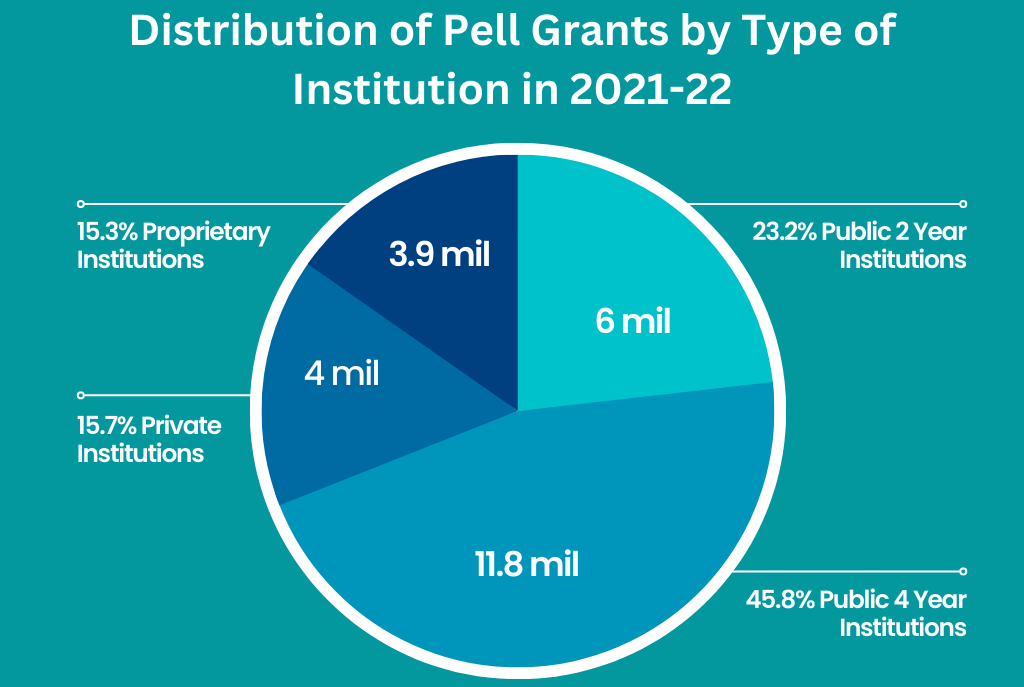Each year, the Pell Grant program enables over 1.5 million community college students with financial need to pay for tuition, books, transportation, and living expenses. The Pell Grant remains a valuable investment in a better-educated workforce, higher wages, and a stronger economy. Amid soaring inflation, community colleges are leading the way to allow millions of students and workers to gain the valuable education and workforce training they need to increase their earning potential. Continued funding for the Pell Grant program is a vital component to our nation’s long-term economic strength and global competitiveness.
Source: U.S. Department of Education, Fiscal Year 2024 Budget Request, 2023.
Community College Facts About Pell Grants
- 4.5 million credit-bearing students attended community colleges last year.
- 1.6 million community college students receive a Pell Grant.
- $6 billion in total Pell Grants are awarded annually to community college students.
- 23% of Pell Grant funds nationwide go to community college students.
Pell Grants play a much more prominent role in community college student financing than in other sectors for two primary reasons. Community college students, on average, have the lowest incomes, and they also pay the lowest average tuition—in the fall of 2022 the average cost of attendance was $3,860 for a full-time, full-year, in-state student. This means that Pell Grants cover more expenses for community college students than for those attending other types of institutions. This helps to minimize student borrowing; just 15% of all community college students take out federal loans. Keeping the Pell Grant program whole and maintaining eligibility for needy students remains a top priority for ACCT.
In addition to increasing funding levels for the Pell Grant, education advocates have been urging Congress to make such needed reforms to the program. Our most recent victory comes as Congress extended Pell Grants access to incarcerated students known as Second Chance Pell after an almost 30-year ban of the program. These changes will go into effect July 1, 2023, after the Biden Administration published the regulations that will govern Second Chance Pell in the Fall of 2022. In 2023, we will continue to advocate for the expansion of Pell grant eligibility to short-term workforce programs.
Second Chance Pell
Along with expanding program eligibility, community colleges have been leading advocates to repeal the ban on Pell Grants for incarcerated students, which was implemented as part of broad crime legislation in 1994.
By increasing financial barriers to education this in turn dramatically decreased the number of educational opportunities available for incarcerated individuals. In 2015, the Department of Education launched the Second Chance Pell Experiment which allowed incarcerated individuals to access Pell Grants to examine the impact it would have on their participation in postsecondary educational opportunities. The program proved, yet again, that providing financial aid to incarcerated students improves their access to postsecondary education and leads to positive outcomes for participants including reduced recidivism, increased employment opportunities upon re-entry, and greater civic engagement.
In December 2020, our advocacy came to fruition when Congress included Second Chance Pell in the Consolidated Appropriations Act of 2021. The Department of Education then convened rulemaking around Second Chance Pell in the fall of 2021.
This led to the release of final regulations that will reinstate access to the Pell Grant for incarcerated individuals starting July 1, 2023. The regulations outline the guidelines, provisions, and standards postsecondary prison education programs must meet to be eligible to receive Pell Grant funds. To read more about this guidance click, here.
It is estimated that over 760,000 individuals will benefit from the reinstatement of Second Chance Pell. ACCT anticipates an increase in education programs for incarcerated students this summer and looks forward to the role our institutions will play in expanding access to high-quality postsecondary education for those who are incarcerated, as it is central to community colleges’ open access and equity mission.
Workforce Pell Grant
The rise of micro-credentials has increased the demand for community colleges to offer more short-term workforce programs. According to data from National Center for Education Statistics, the number of certificates below the associate degree level conferred by public institutions increased from approximately 520,000 in the 2010-11 academic year to over 696,000 in the 2020-21 academic year. For community colleges specifically, over 40% of students are enrolled in non-credit programs according to the American Association of Community Colleges.
However, despite the increase in popularity of these programs, which often run anywhere from 5-14 weeks long, students may not currently use Pell Grant funds to cover programs shorter than 15 weeks. Creating financial barriers for students wishing to upskill themselves. This has made extending Pell eligibility to short-term workforce programs a top priority for community colleges over the last several years.
In the 117th Congress, Workforce Pell, also commonly known as Short-Term Pell, came remarkably close to becoming law with bipartisan language that moved in the American COMPLETES Act, but was ultimately left out in the Conference Committee process.
The 118th Congress looks ripe for Workforce Pell as three separate bills in support of the program have been introduced this Congress.
Senators Kaine (D-VA) and Braun (R-IN) and Representatives Johnson (R-OH-06), Blunt-Rochester (D-DE-At Large), Turner (R-OH-10), and Sherrill (D-NJ-11) introduced the Jumpstarting Our Businesses by Supporting Students (JOBS) Act in late January 2023. The text of the bill can be found, here and a summary can be found here.
Chairwoman Foxx (R-NC-05) and Representative Stefanik (R-NY21) introduced their own version called the Promoting Employment and Lifelong Learning (PELL) Act. The text of the bill can be found, here and a summary can be found here.
In March 2023, Ranking Member Bobby Scott (D-VA-03) introduced the Jobs to Compete Act. The text of the bill can be found here and the fact sheet can be found, here.
ACCT is currently reviewing these bills and monitoring the progress of Workforce Pell throughout the 118th Congress. For a deeper dive into Workforce Pell and a side-by-side comparsion of the above bills, click here.
